|
|
|
Sort Order |
|
|
|
Items / Page
|
|
|
|
|
|
|
| Srl | Item |
| 1 |
ID:
190422
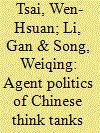

|
|
|
|
|
| Summary/Abstract |
This paper analyzes the relationship between the Chinese government and domestic think tanks. Chinese think tanks in the cultural sector have a strong demand-side orientation; that is, they closely follow the instructions of the Chinese Communist Party (CCP) in their stand on culture-related policies. Since 2018, the CCP has strengthened its control over the propaganda and cultural affairs, using think tanks to this end. Think tanks act as dual agents, maximizing the benefits offered by their two principals – the party government and private businesses, while prioritizing the former. The paper examines the development of the Putuo Island Park in Zhejiang Province and the Cultural Industry Research Institute, the key cultural industry think tank in this province. While upholding Xi Jinping’s aspiration of developing China into a “cultural great power,” cultural think tanks’ main function is to endorse government policies and guide businesses to support those policies when necessary. The CCP under Xi has intensified its manipulation of think tanks to reinforce its control over ideology and the socialist market economy, resulting in a more complex relationship between the state and think tanks.
|
|
|
|
|
|
|
|
|
|
|
|
|
|
|
|
| 2 |
ID:
163665
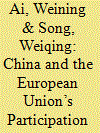

|
|
|
|
|
| Summary/Abstract |
This article addresses the central question of why China and the European Union (EU), two players of growing importance in global governance, cooperate on some issues of conflict resolution, but fail to do so on others. Although much discussion is devoted to their respective strategic orientations and policy preferences in world affairs, more deep-rooted factors like norms and values should also be taken into consideration. This article follows a social constructivist approach to explicate how international norms have shaped the convergent and divergent actions of China and the EU in two empirical cases: the Iranian nuclear issue and the Syrian civil crisis. It argues that because China and the EU had both internalized the international norm of multilateralism, they could cooperate in pushing for a political solution to the Iranian nuclear issue through multilateral negotiations, and take a similar approach to the Syrian civil crisis. However, whereas China has seriously questioned the ‘responsibility to protect’ as a legitimate norm, the EU has embraced and promoted it. Consequently, the two took divergent actions in the second case. It is suggested that China and its Western partners closely engage each other in constructive communication to promote mutual understanding, and ultimately expand the basis of their common norms.
|
|
|
|
|
|
|
|
|
|
|
|
|
|
|
|
| 3 |
ID:
183715
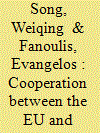

|
|
|
|
|
| Summary/Abstract |
The European Union's partnership with China has received significant academic attention. Experts have focused on both parties’ economic and political objectives and have made efforts to grasp the dynamics of the institutionalisation of EU-China cooperation. However, little has been said about how this collaboration affects the lives of citizens, especially in China. Adopting a Foucauldian epistemology, this article's key contention is that EU-China cooperation imposes a joint form of post-liberal governmental power on the Chinese population, which socially constructs empowered but not liberal political subjectivities for Chinese citizens. The article first reviews Foucault's approach to governmentality. It then explores Sino-EUropean collaboration after 2013, when the two partners established the ‘EU-China 2020 Strategic Agenda for Cooperation’. We illustrate how the institutionalisation of the partnership has been consistent with a governmentalised political rationality, and how policy implementation has allowed a post-liberal form of governmental power to flow from both EU and Chinese policymakers towards the Chinese population, triggering processes of political subjectivisation.
|
|
|
|
|
|
|
|
|
|
|
|
|
|
|
|
| 4 |
ID:
127774
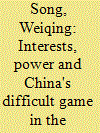

|
|
|
|
|
| Publication |
2014.
|
| Summary/Abstract |
The Shanghai Cooperation Organization (SCO)-an organization interpreted in various ways-officially announced that it intended to ensure regional security by countering international terrorism, ethnic separatism and religious extremism. This article discerns the motivations of the SCO members, arguing that they have their respective, albeit occasionally mutual, interests and priorities. There is generally asymmetry of interests-the principal reason why the SCO's strategic situation is largely a suasion game between China and the members-with China demonstrating a greater interest in the SCO; moreover, the power asymmetry between China and the Central Asian members and the power equality between China and Russia further complicates the situation. This sophisticated relationship implies that despite some measurable results, the SCO faces tremendous challenges in becoming a well-established regional organization.
|
|
|
|
|
|
|
|
|
|
|
|
|
|
|
|
| 5 |
ID:
169130
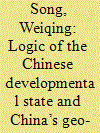

|
|
|
|
|
| Summary/Abstract |
This study addresses China’s cooperation with Central and Eastern European (CEECs) countries, centred around what is popularly known as the ‘16 + 1’ process. It aims to unravel the link between China’s domestic sources and its ambition to become an international leader in the global economic order and governance related to Central and Eastern Europe (CEE). It argues that China’s economic expansion to faraway regions like CEE is a necessary outgrowth of its developmental state model, both economically and politically. The nature of this model has largely dictated China’s way of engaging the CEE region and its concomitant outcomes and responses. Although the era of globalisation has afforded China good opportunities to expand in the global economic domain, it has found itself substantially constrained by diverse factors, both domestic and external. Despite some notable progress, this complexity requires China to generate feasible strategic choices if it wishes to succeed in its global economic endeavours. Given that China must adapt to the outside world, its foreign partners should in turn accommodate China in this globalised world.
|
|
|
|
|
|
|
|
|
|
|
|
|
|
|
|
| 6 |
ID:
108468
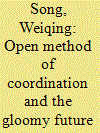

|
|
|
|
|
| Publication |
2011.
|
| Summary/Abstract |
This article addresses an important topic of European public policy: the project of Social Europe within the overall Lisbon Strategy and its related policy instrument, the Open Method of Coordination (OMC). Through the theoretical lens of the Garbage Can Model in organisational theory, the article seeks to show how, in the context of tremendous socio-economic challenges, European leaders adopted the OMC largely to strike a political compromise rather than for effective problem solving. Because of its inherent weakness, together with both internal and external challenges, the OMC is deemed too difficult to serve as an effective instrument. This has largely been confirmed by the disappointing performance over the 10 years since the Lisbon Agenda. Thus, although the OMC may be praised for its value in experimental governance, the prospects for the Social Europe project over the next decade remain uncertain.
|
|
|
|
|
|
|
|
|
|
|
|
|
|
|
|
| 7 |
ID:
183642
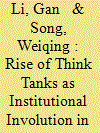

|
|
|
|
|
| Summary/Abstract |
This analytical essay addresses the rise of Chinese think tanks in recent years. Despite their rapid growth, think tanks in China are generally shown to be becoming less effective in their normal functions and increasingly bureaucratic and dysfunctional. This essay adopts the concept of involution as its organizing framework. It argues that due to political and ideological impediments, Chinese think tanks are encumbered by institutional involution, a process of increasing in number and yet becoming more internally complicated. It asserts that the rise of Chinese think tanks provides minor yet telling evidence of involution within China's current governance system. The essay concludes by highlighting that this phenomenon is not unusual, but rather a pervasive and natural outcome of the Chinese post-socialist regime.
|
|
|
|
|
|
|
|
|
|
|
|
|
|
|
|
| 8 |
ID:
157506
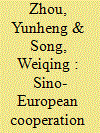

|
|
|
|
|
| Summary/Abstract |
Despite considerable differences in their level of social and economic development, China and Europe both face the challenges of energy insecurity and environmental degradation. Given their shared sustainable development objectives and the complementarity of their comparative advantages, the two have great potential for cooperation, which should provide both the motivation and capabilities to cooperate in relevant areas. However, there are a number of barriers and impediments at both the macro- and micro-levels. China and Europe should focus their joint efforts on several key areas of feasible renewable energy sector cooperation, including strengthening institutional links, facilitating bilateral investment and coordinating positions and actions in multilateral settings. Concrete cooperation in the renewable energy sector can cement the China-EU strategic partnership, thereby bringing benefits to both sides and beyond.
|
|
|
|
|
|
|
|
|
|
|
|
|
|
|
|
| 9 |
ID:
142866
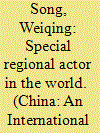

|
|
|
|
|
| Summary/Abstract |
This study examines the diplomatic behaviour of the Macao Special Administrative Region (MSAR) of China, a special substate region, in its external relations. Based on Macao’s experiences, three major diplomatic types have been conceptualised: intrastate diplomacy with mainland China, substate diplomacy as a part of a wider Chinese national polity and quasi-state diplomacy as an autonomous entity in international affairs. Further empirical evidence is drawn from three case studies on the Closer Economic Partnership Agreement, the Sino-Portuguese Economic Forum and the bilateral relations between Macao and the European Union. The diplomatic behaviour of the MSAR is further characterised in terms of its practices, motivations and strategies. The objective of this study is to contribute both conceptually and empirically to a scholarly understanding of diplomacy by a substate region, in the fields of international relations, comparative federalism and China studies.
|
|
|
|
|
|
|
|
|
|
|
|
|
|
|
|
|
|
|
|
|